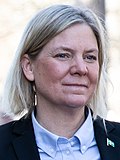Electoral system
The Riksdag is made up of 349 seats elected by open list proportional representation, [3] with an electoral threshold of 4% of the national vote or alternatively 12% within a single constituency. Of the 349 seats, 310 are elected from 29 constituencies ranging in size from 2 to 40 seats, while the other 39 seats are apportioned nationally as levelling seats to ensure parties that passed the 4% national threshold hold a proportional number of seats; these levelling seats are allocated to particular districts. If a party wins more constituency seats than it is entitled to overall, a redistribution of constituency seats may occur to reduce the number of constituency seats won by that party. [4]
General elections are held on a fixed date, the second Sunday of September, at the same time as the municipal and regional elections. [5] [6] [7] If early elections are called, the newly elected legislature only serves out the remainder of the four-year term begun by the previous legislature.
This page is based on this
Wikipedia article Text is available under the
CC BY-SA 4.0 license; additional terms may apply.
Images, videos and audio are available under their respective licenses.









